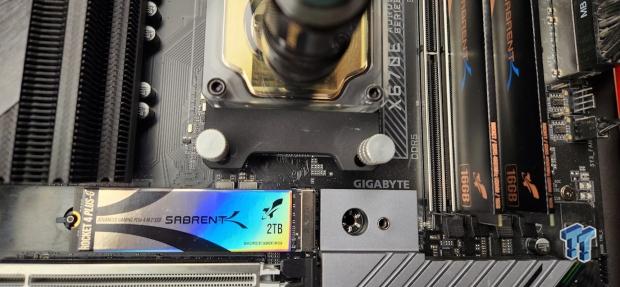
The Bottom Line
Pros
- + Gaming
- + Sustained reads
- + PS5 compatible
Cons
- - None
Should you buy it?
AvoidConsiderShortlistBuyIntroduction & Drive Details
We consider Sabrent to be the most forward-thinking SSD company on the planet. Sabrent, for years now, has been pumping out industry firsts. The industries first 4TB M.2 NVMe SSD was from Sabrent years ago, back when other companies were reluctant to even bring forth 2TB M.2 NVMe SSDs. Shortly after, Sabrent launched the first of its kind 8TB M.2 NVMe SSD firmly cementing in our minds that Sabrent is the most forward-thinking SSD company in existence. Just recently Sabrent delivered another industry first, with its Rocket 4 Plus 8TB being the world's first 8TB PCIe Gen4 M.2 SSD. One thing all of these industry firsts have in common is they are a collaborative effort between Phison Electronics, themselves one of the most forward-thinking SSD companies, and Sabrent.
For example, just a couple of months back, Phison revealed that it has been developing the industry's first firmware focusing on Microsoft's DirectStorage API. We got a foretaste of this when we previewed Phison's I/O+ firmware for Direct Storage.
With all this in mind, it comes as no surprise that Sabrent and Phison have yet again been collaborating with one another to bring the first retail SSD fortified with firmware optimized for Microsoft's DirectStorage texture streaming API. This is a drive that many of you have caught wind of and possibly even pre-ordered. The drive we are speaking of is Sabrent's Rocket 4 Plus-G. The Rocket 4 Plus-G is based on Sabrent's wildly popular Rocket 4 Plus with a couple important differences, necessitating a new series, the "G" or Gaming series.
First and most importantly, the Rocket 4 Plus-G is arrayed with faster 1,600 MT B47R flash in place of the previously employed 1,200 MT Micron B47R. Firmware aside, faster flash means faster performance across the board, so we love this change. Then there is the Rocket 4 Plus-G's exclusive Direct Storage focused firmware codeveloped by Sabrent and Phison. Sabrent's state-of-the-art O₂ GO firmware is the real deal when it comes to sustained texture streaming, as demonstrated by the following chart:
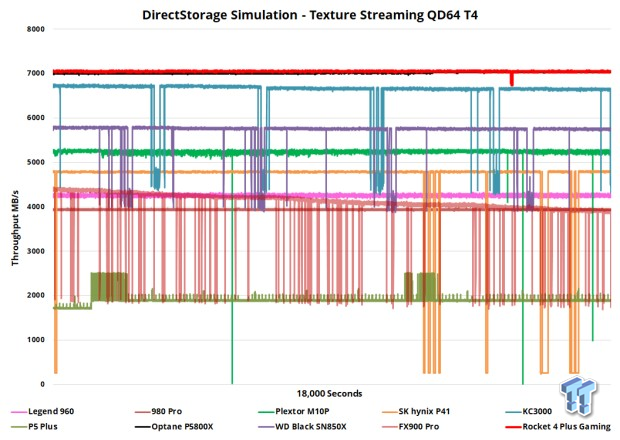
The above chart was derived by using Phison's own in-house DirectStorage test. This test is said to accurately simulate DirectStorage texture streaming workloads. This test should allow us to explore how well current SSDs are prepared for DirectStorage as it relates to gaming. The test is heavy duty taking around 20 hours per SSD to complete.
Stunning results here where we find the Rocket 4 Plus-G incredibly delivering even more sustained texture streaming throughput than Intel's Optane P5800X. This is what we mean when we say forward-thinking. Phison and Sabrent are the first to be ready for DirectStorage Gaming when it lands in the near future. Ready as in obviously capable of delivering the absolute highest sustained high QD random read throughput possible over a PCIe Gen4 x4 interface. Look at that chart, non-Phison controlled SSDs are at a huge disadvantage, not only in terms of throughput but also as it relates to read-disturb performance hits, which are indicated by dips on the graph.
If you are a forward thinker as it relates to hardware, then Sabrent's newest SSD is absolutely worth taking a close look at. DirectStorage is set to take the gaming world by storm in the near future. Microsoft's DirectStorage API (Application Programming Interface) is set to enrich your gaming experience by introducing a new era of fast load times and detailed worlds in PC games by allowing developers to more fully utilize the speed of the latest storage devices.
"DirectStorage will bring best-in-class IO tech to both PC and console just as DirectX 12 Ultimate does with rendering tech. With a DirectStorage-capable PC and a DirectStorage-enabled game, you can look forward to vastly reduced load times and virtual worlds that are more expansive and detailed than ever." - Andrew Yeung, Microsoft.
With DirectStorage-enabled games, your high-capacity SSD functions like a cache for the GPU. A huge cache. A game with 200GB data, for example, is limited by system memory capacity, and must flush and load new data as the game progresses. DirectStorage, on the other hand, makes the entirety of the game's data immediately available via direct texture streaming from SSD to GPU. This direct storage path enables the full power of NVMe storage for gaming. Think about it. As it stands currently, there is little noticeable difference whether gaming on SATA SSD or a Gen4 NVMe SSD, even though the latter is capable of 12x the data throughput. With DirectStorage, all that throughput can now come into play as a better gaming experience.
DirectStorage is constantly fetching textures during gameplay. This translates into a sustained read workload at the drive level during the gaming session. Intense gaming sessions can easily be 12 hours or longer. So, as it relates to DirectStorage, a superior gaming SSD needs to be able to sustain texture streaming at a high level for hours or even days on end, which turns out to be quite the ask for most NVMe SSDs in their current form, that is unless you have Sabrent's Rocket 4 Plus-G serving that data directly to your GPU.
Drive Details
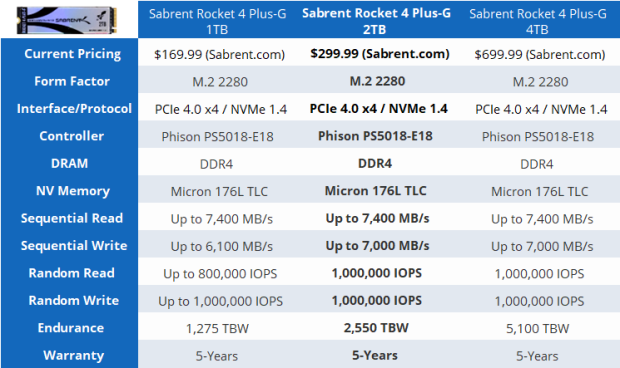
Please note, these performance specs are based on our results while benching the Rocket 4 Plus-G and are not official Sabrent performance numbers. Additionally, TBW is estimated and not an official Sabrent specification.
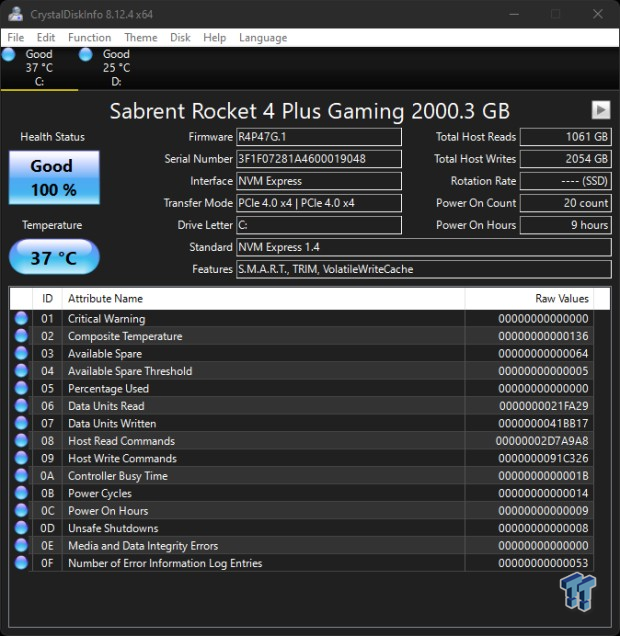
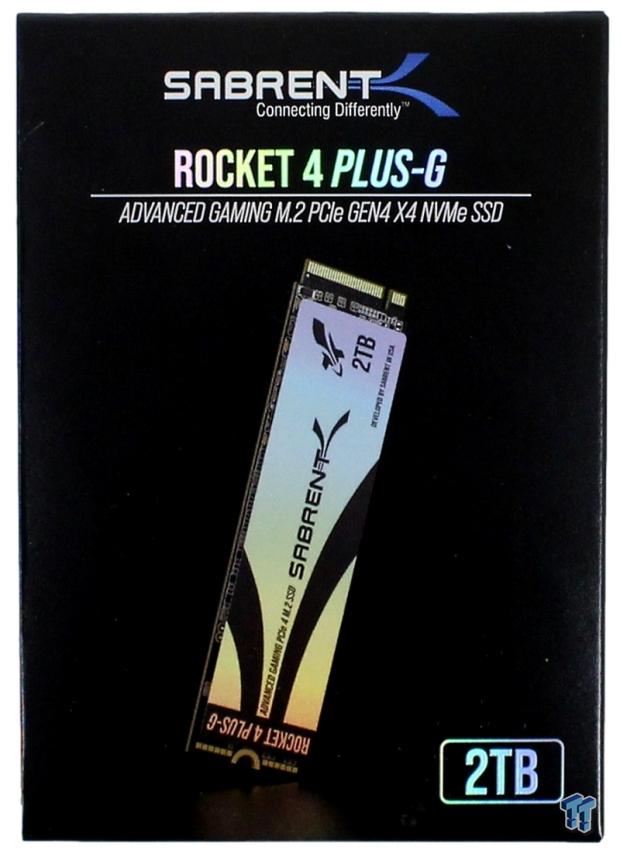
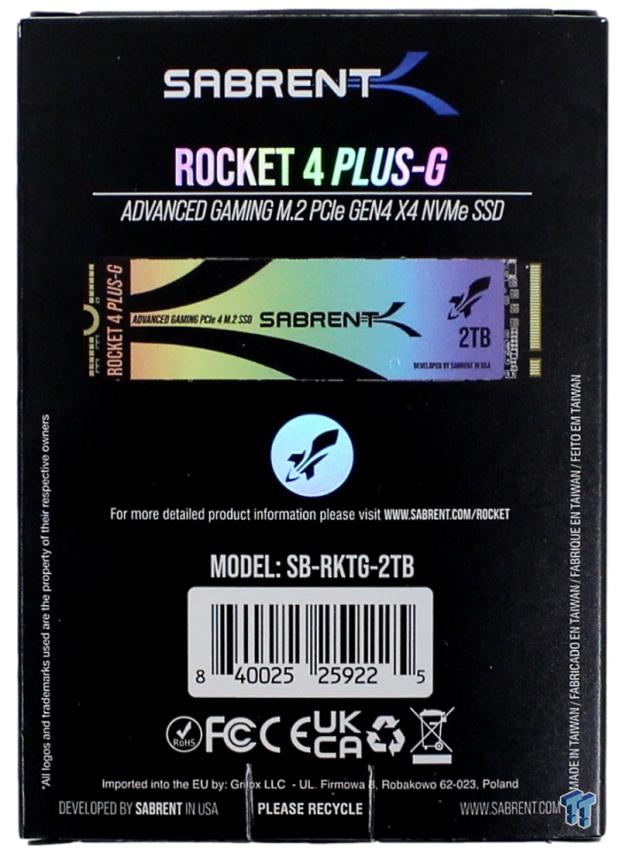


The Rocket 4 Plus-G looks similar to the standard Rocket 4 Plus, but the G series is visually distinctive with its reflective iridescent anodized copper label.
All Sabrent SSDs come with valuable complimentary software, including a copy of Acronis for Sabrent and Sabrent's award-winning Rocket Control Panel SSD management software. You can get Sabrent's Rocket Control Panel here.
Use Rocket Control Panel to download Acronis and other Sabrent complimentary SSD management software. Register your Sabrent SSD via the Rocket Control Panel to activate a limited 5-year warranty, the limitation being TBW (Total Bytes Written). Without registration, Sabrent warrants its SSDs for 1-year, so be sure and register your Sabrent SSD.
Jon's Test System Specifications
Intel Test System
- Motherboard: ASUS ROG Z690 HERO
- CPU: Intel Core i9-12700K - Buy from Amazon
- Cooler: Alphacool Eissturm Hurricane Copper 45 - Buy from Amazon
- RAM: Sabrent Rocket DDR5 32GB - Buy from Amazon
- Graphics Card: MSI SUPRIM X RTX 3080 12GB - Buy from Amazon
- Case: PrimoChill's Praxis Wetbench - Buy from Amazon
- Power Supply: be quiet! Dark Power Pro 12 1200W - Buy from Amazon
- OS: Microsoft Windows 11 Pro 64-bit - Buy from Amazon
AMD Test System
- Motherboard: GIGABYTE X670E AORUS Master
- CPU: AMD Ryzen 5 7600X - Buy from Amazon
- Cooler: Alphacool Eissturm Hurricane Copper 45 - Buy from Amazon
- RAM: Sabrent Rocket DDR5 32GB - Buy from Amazon
- Graphics Card: MSI SUPRIM X RTX 3080 12GB - Buy from Amazon
- Case: PrimoChill's Praxis Wetbench - Buy from Amazon
- Power Supply: be quiet! Dark Power Pro 12 1200W - Buy from Amazon
- OS: Microsoft Windows 11 Pro 64-bit - Buy from Amazon
Because we at TweakTown like to be first at everything whenever we can, we are going to present our storage performance results for the test subject on both 12th Gen Intel and 7000 Series AMD platforms going forward for the foreseeable future. Because Intel still delivers the best real-world storage performance, (Look Here), our running chart will continue to be Intel-based until such time as AMD can deliver better real-world storage performance than its rival.

Sony PlayStation 5 - M.2 Storage Expansion
PS5 Read Performance
With Sony's wildly popular PlayStation 5 console now enabled for M.2 NVMe SSDs to be used as fast storage expansion, we include results for PS5 compatible SSDs we test as a part of our reviews going forward. We are utilizing the newest PS5 hardware and software versions.
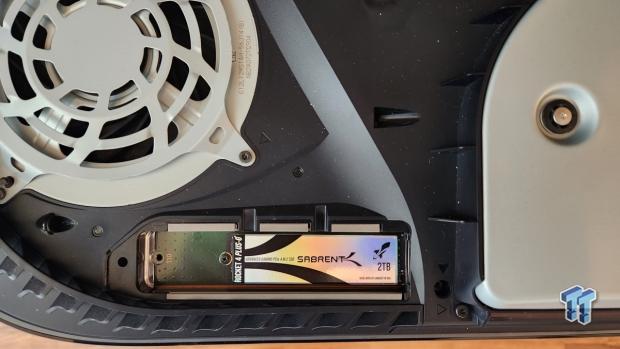
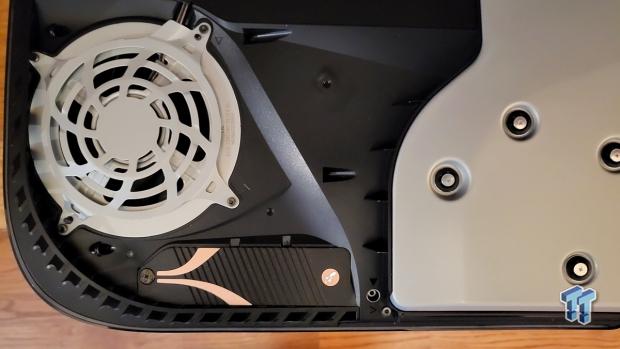
For 5,500 MB/s plus capable SSDs that don't have an adequately sized PS5 compatible heat sink or other SSDs where the heat sink provided doesn't fit right and can be removed, we both use and recommend Sabrents unparalleled PS5 heat sink available here.
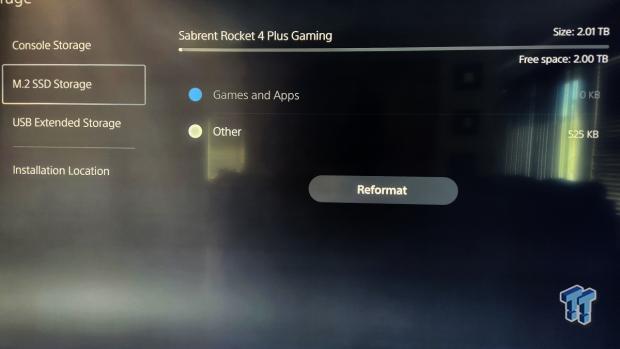
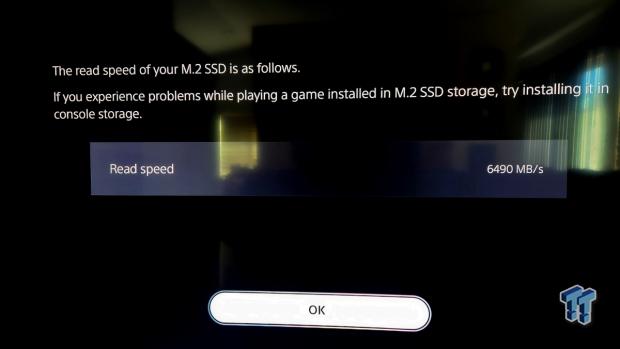
We only chart SSDs that can deliver a minimum of 5,500 MB/s read, which is Sony's original recommendation.
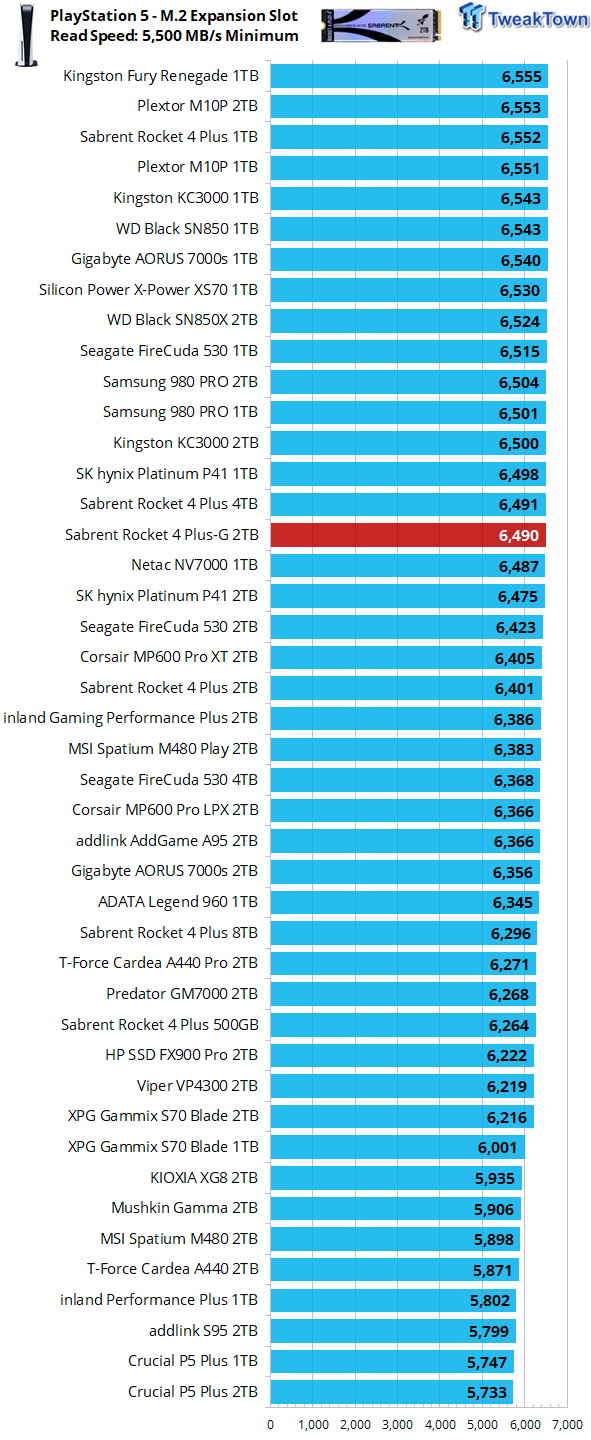
The 2TB Rocket 4 Plus-G delivers the second-best 2TB E18 controlled results we've seen to date. It's coming in at 89 MB/s higher than the regular 2TB Rocket 4 Plus. Outstanding.
Synthetic Benchmarks: CDM, Anvil, ATTO
CrystalDiskMark
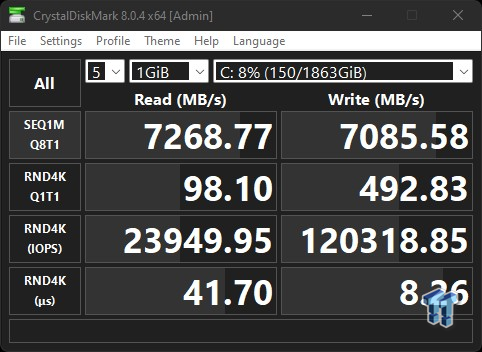
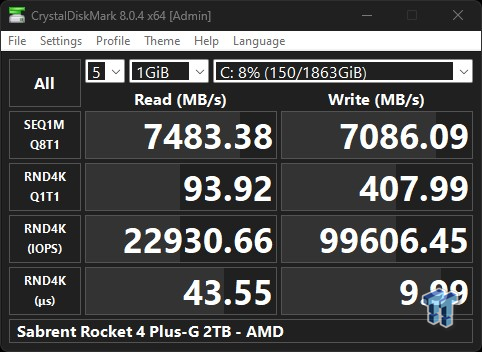
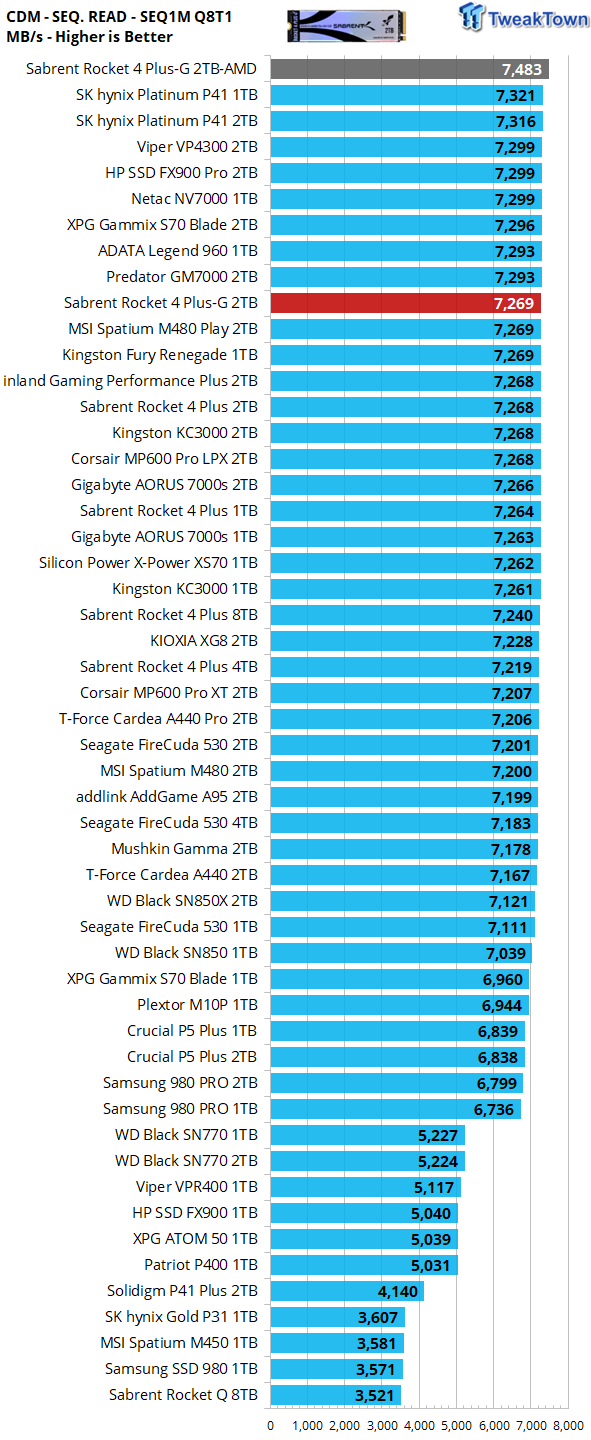
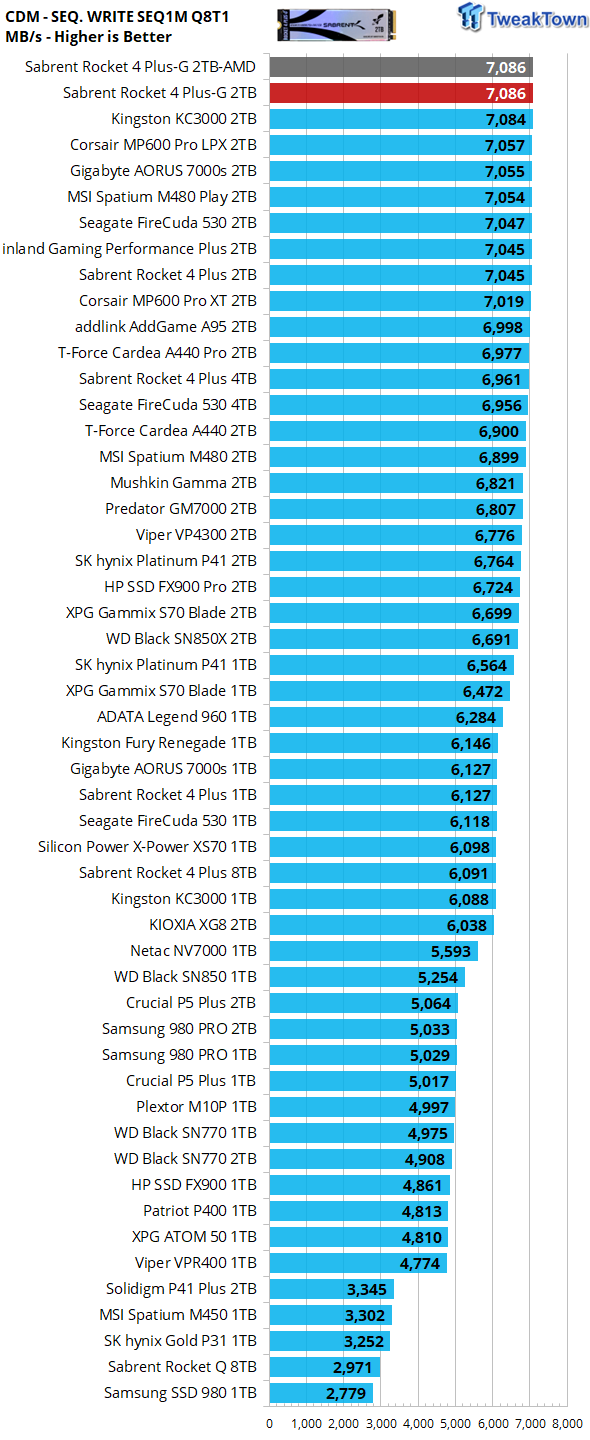
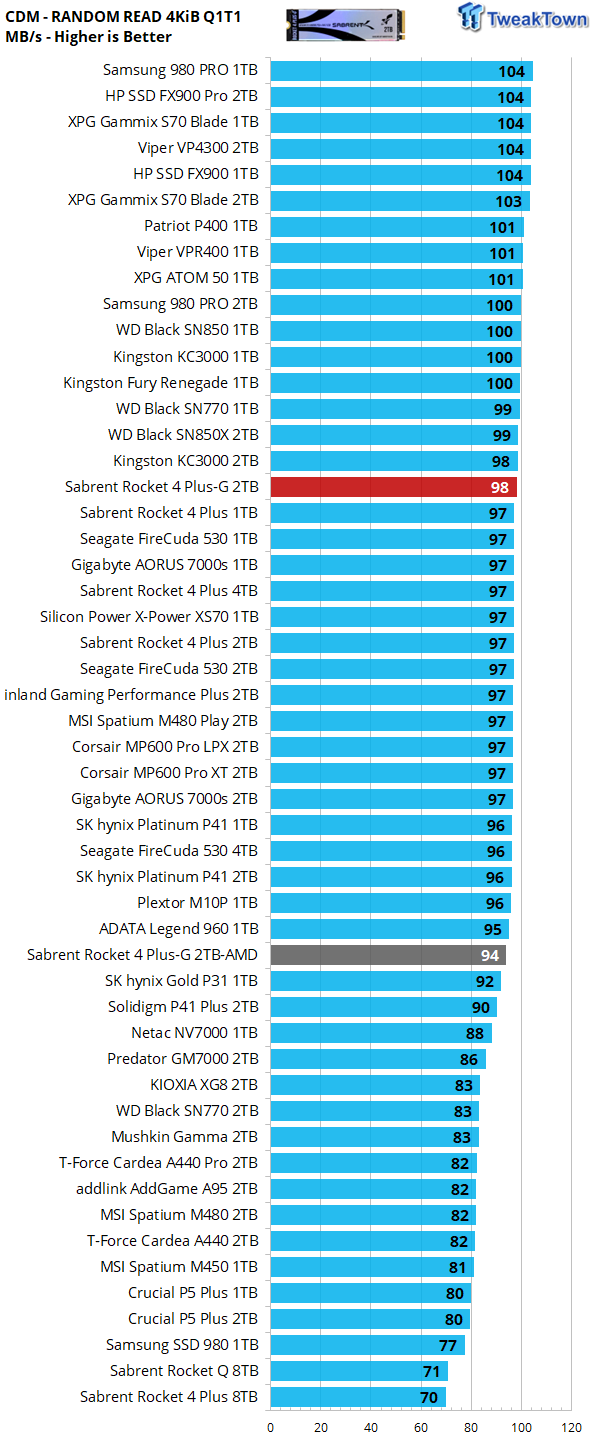
AMD continues to deliver the highest sequential throughput, so it's no surprise to see the lone AMD result at the top of our Intel-based chart. However, do keep in mind that sequential throughput is not a true measure of real-world performance in any way, shape, or form. On the Intel side of things, our 2TB test subject is delivering the highest sequential throughput we've ever extracted from an E18-controlled SSD, including the mighty KC3000. Sequential write throughput is the same for both platforms, and at 7,086 MB/s, a new lab record.
Moving to the all-important Q1T1 random read chart, we find the Rocket 4 Plus-G 2TB tied with the KC3000 for the most coming from any 2TB E18 controlled we've ever tested. Impressive.
Anvil's Storage Utilities
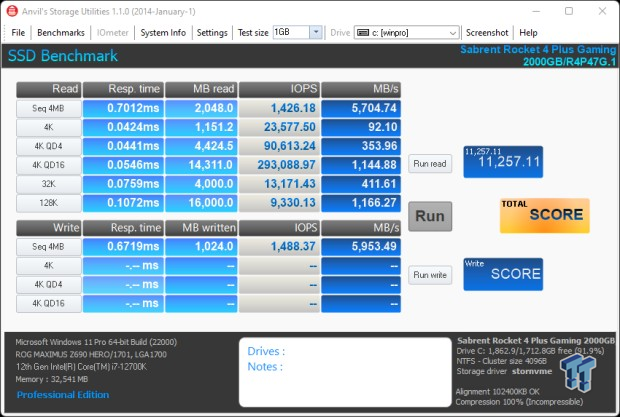
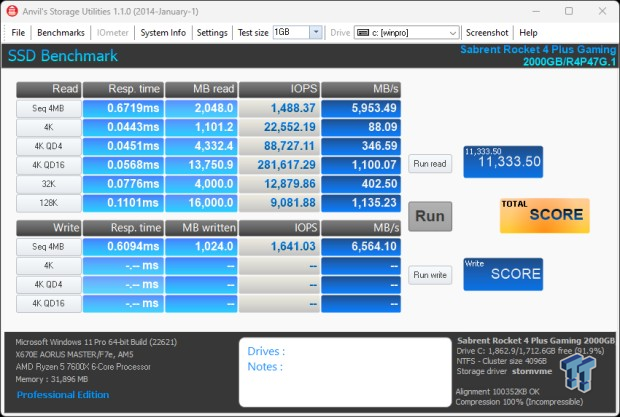
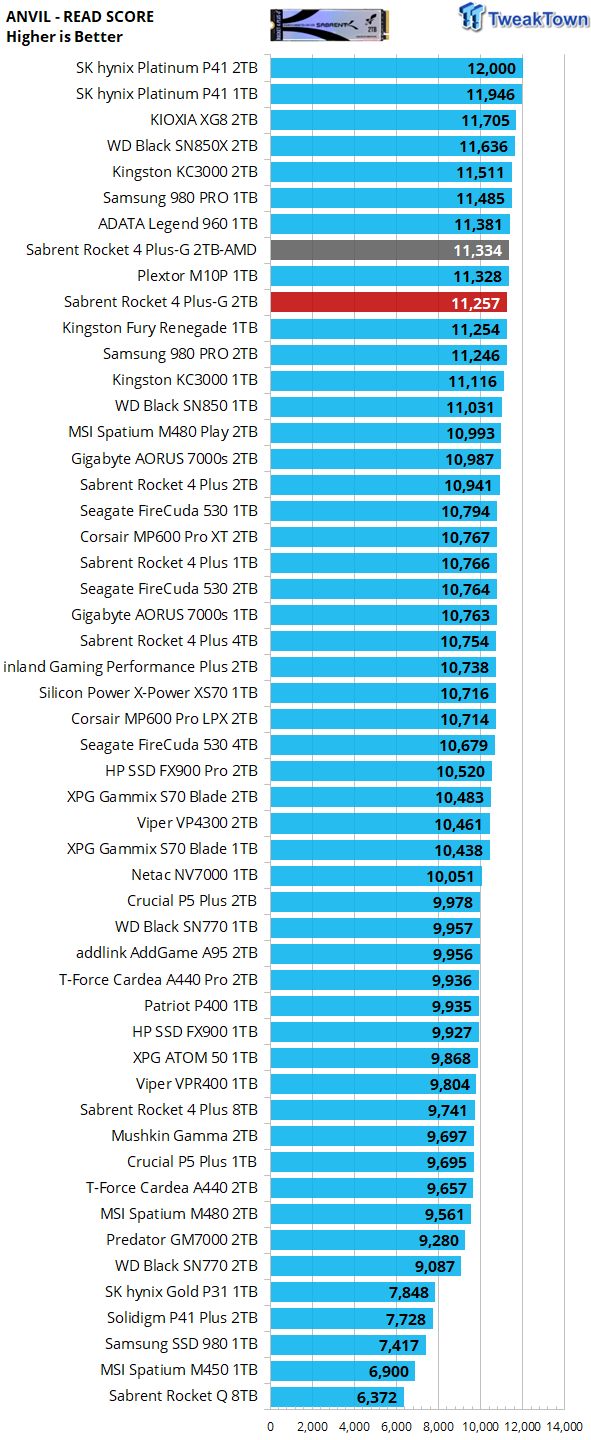
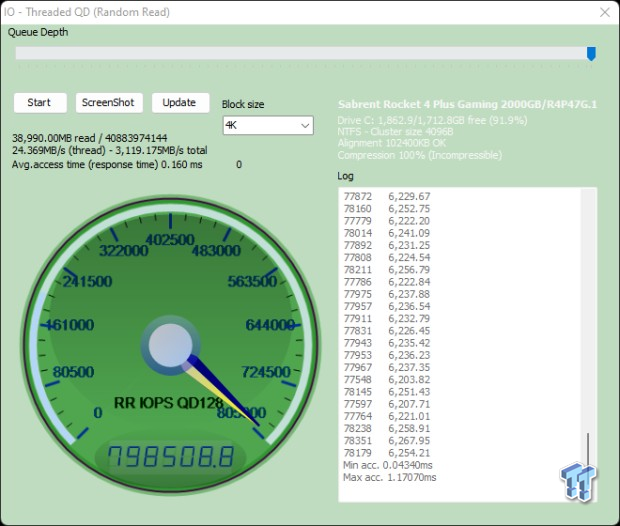
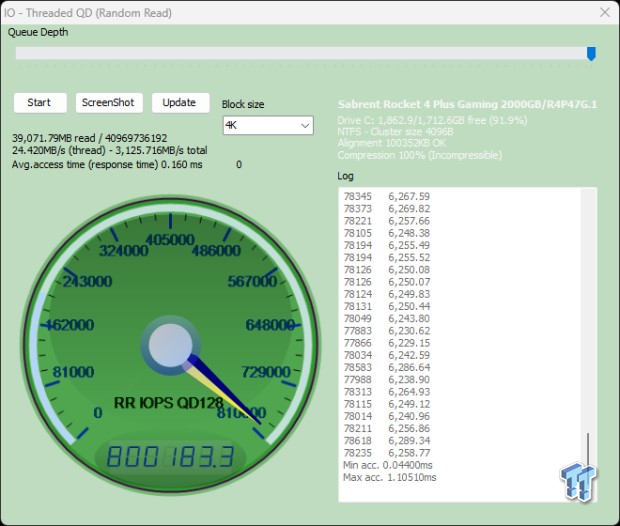
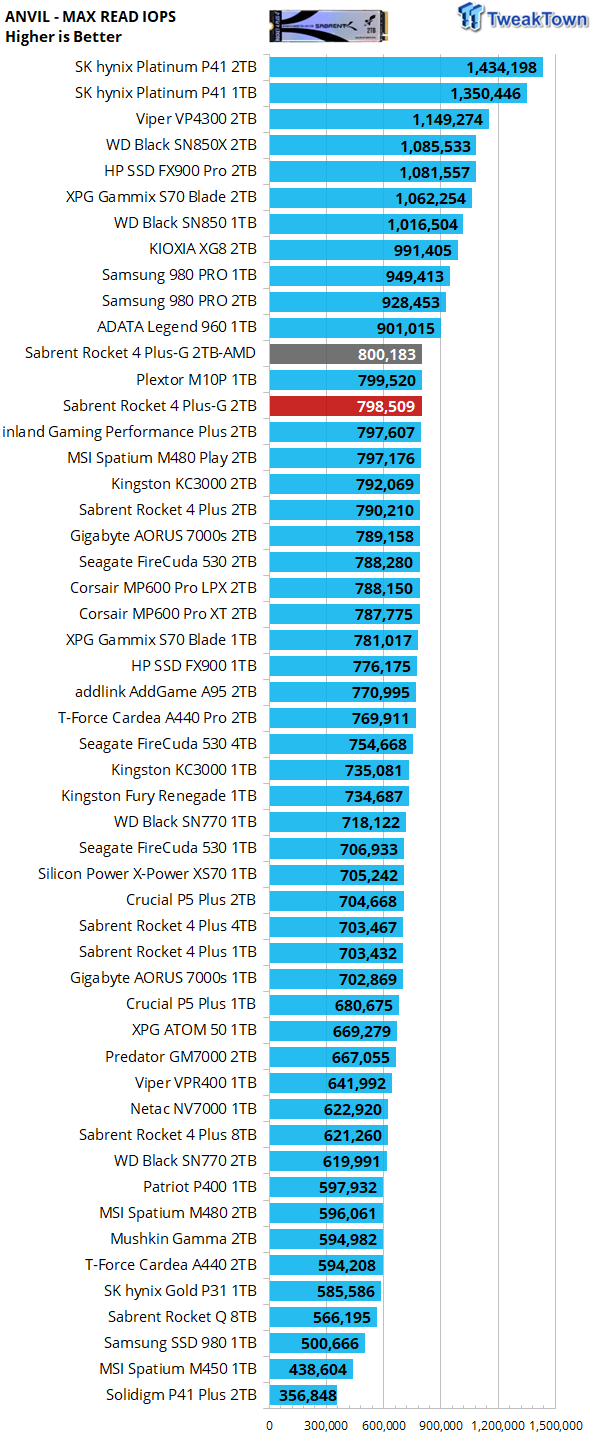
Top of the food chain performance here, second best we've obtained from an E18-controlled SSD. It's again a bit better in terms of overall score on our X670E platform due to AMD's superior sequential throughput boosting the score somewhat.
Looking at MAX random read IOPS, the Rocket 4 Plus-G delivers the best we've seen from any E18-controlled SSD, even besting the mighty KC3000. Impressive.
ATTO
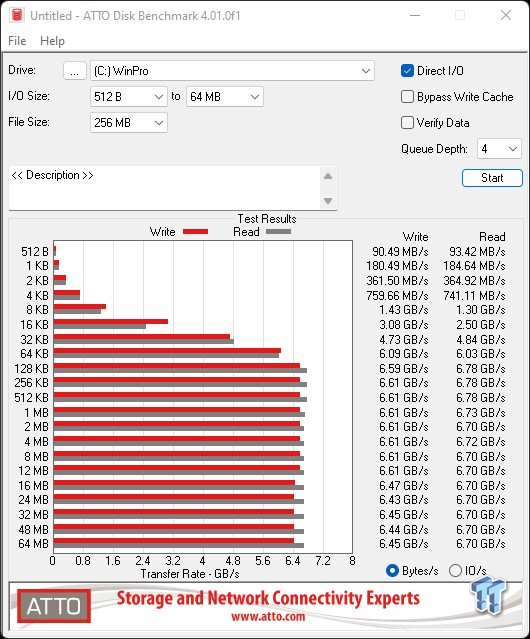
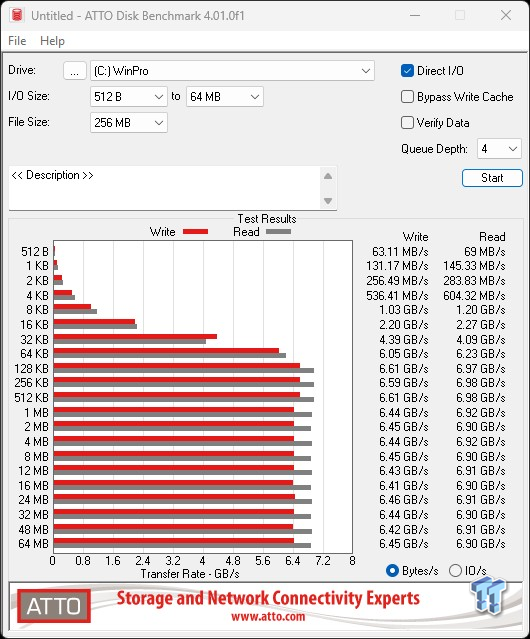
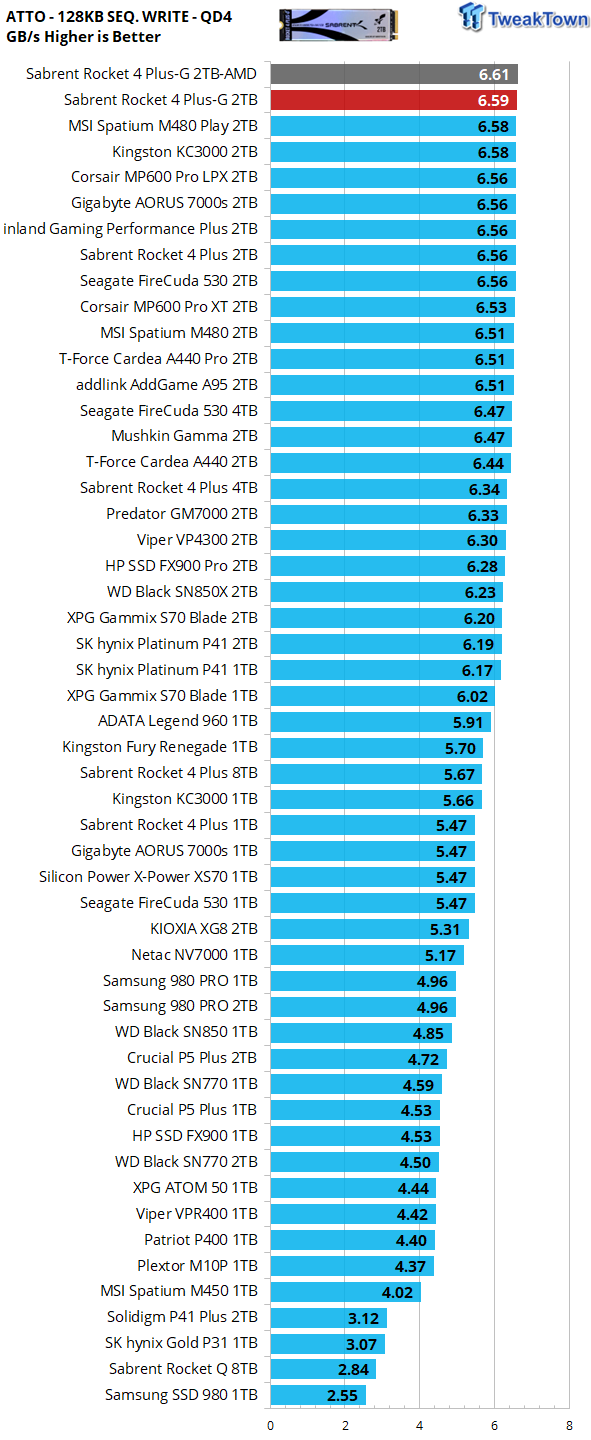
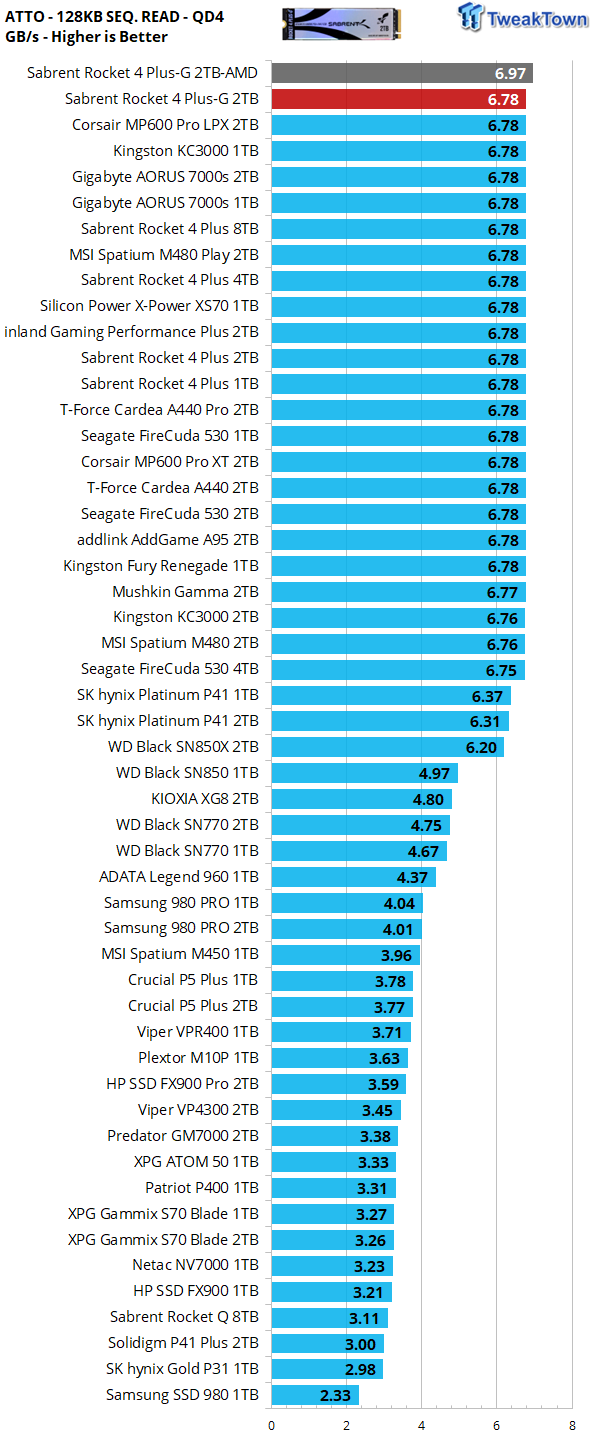
Sequential performance at QD4 comes at the top of our chart for both platforms. On the write side of things, the Rocket 4 Plus-G delivers another lab record. Pretty much the same on the story on the read side of things where Sabrent's new Gaming drive ties for the highest we've obtained to date. Excellent.
Real-World Testing: Transfers, 3DMark SSD Gaming Test, PCM10 Storage
Transfer Rates
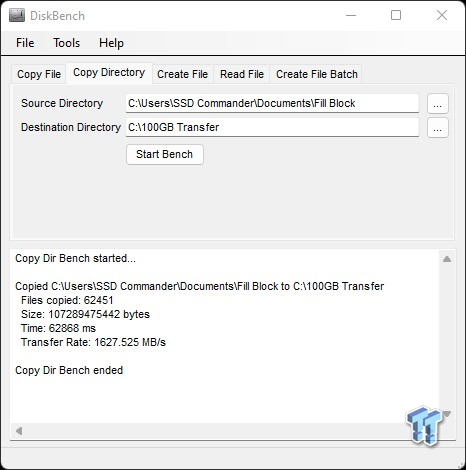
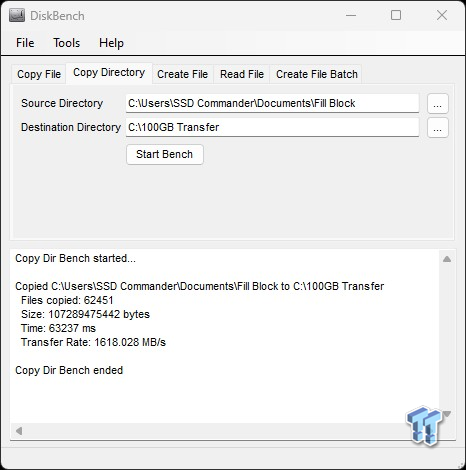
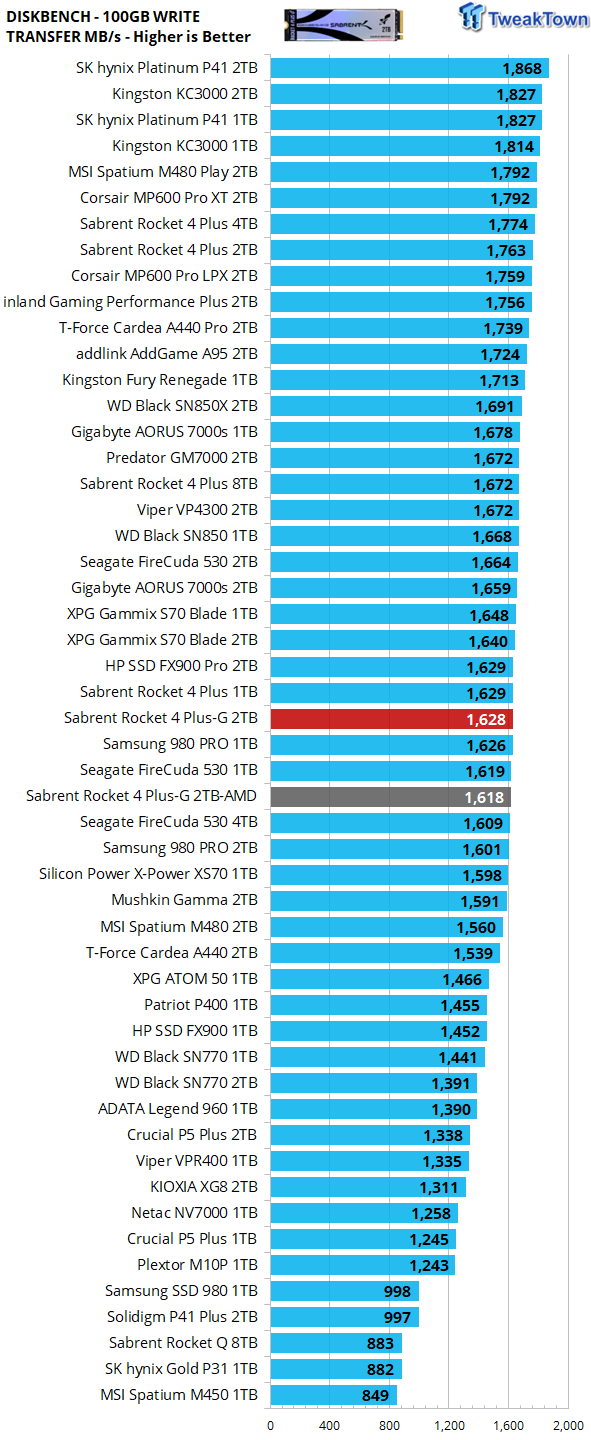
Our 100GB data transfer test is not your ordinary 100GB of data. Ours is a crushing mix composed of more than 62K files. Overall, write performance as it applies to the consumer realm is the least important performance metric, simply because the consumer realm is write infrequently, read frequently. For example, how many times is a game installed vs. how many times it's played? 1,628 MB/s is lower than we've gotten previously from E18 SSDs arrayed with B47R flash. We believe the root cause is Windows 22H2 update, not the SSD. Either way, 1,600 MB/s is plenty good enough for our liking.
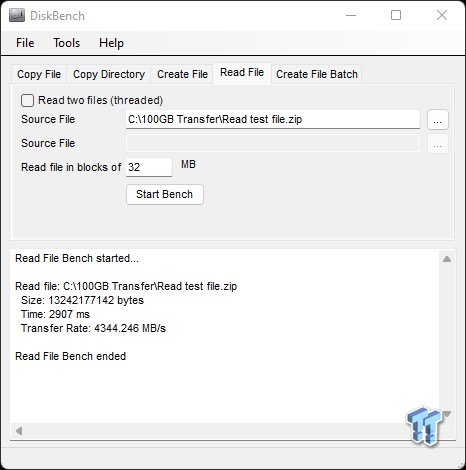
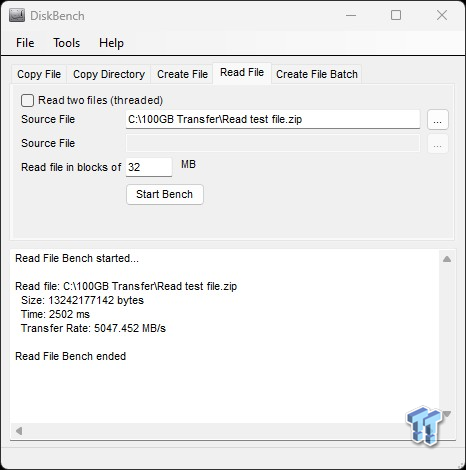
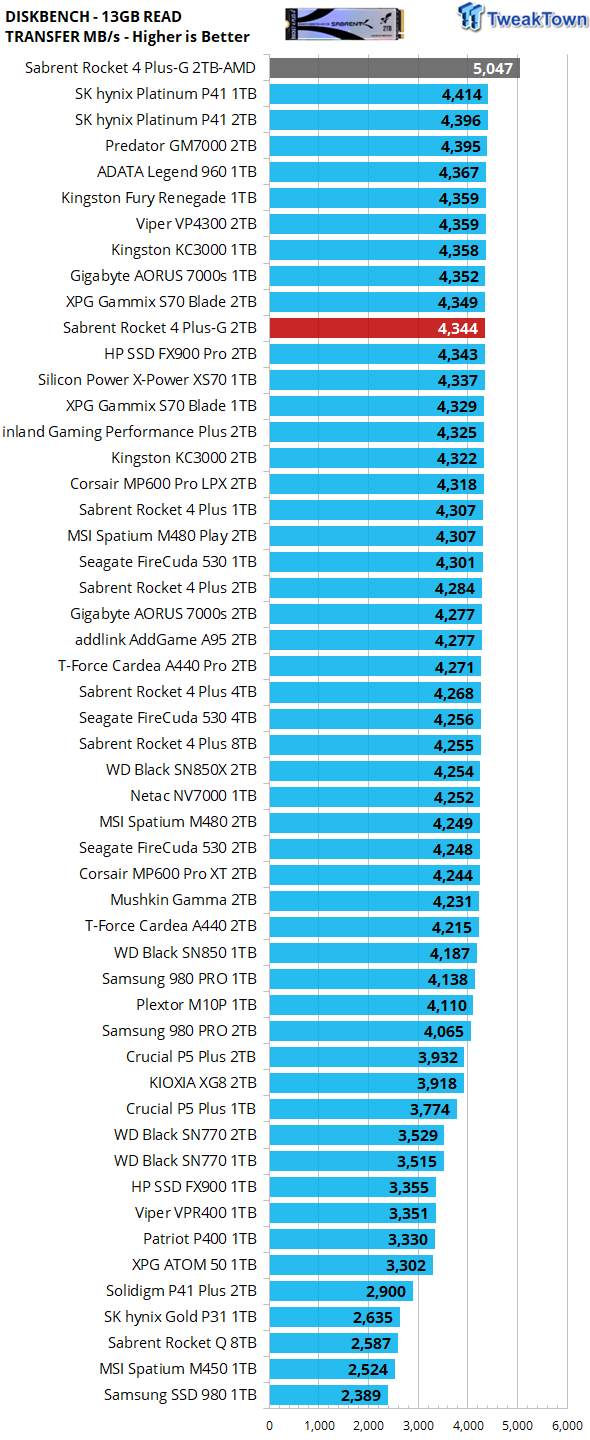
Quite the opposite when it comes to an all-important performance metric like serving data to the host. It's what consumer SSDs are doing 80% of the time on average. Here, the Rocket 4 Plus-G shows us what it's really all about by delivering the best here we've ever seen from any 2TB E18-controlled SSD. On the AMD side, it delivers a lab record. Sabrent's state-of-the-art Oâ‚‚ GO firmware is the difference here, to be sure.
3DMark SSD Gaming Test
UL's newest 3DMark SSD Gaming Test is the most comprehensive SSD gaming test ever devised. We consider it superior to testing against games themselves because, as a trace, it is much more consistent than variations that will occur between runs on the actual game itself. This test is in fact the same as running the actual game, just without the inconsistencies inherent to application testing.
In short, we believe that this is the world's best way to test an SSDs gaming prowess and accurately compare it against competing SSDs. The 3DMark SSD Gaming Test measures and scores the following:
- Loading Battlefield V from launch to the main menu.
- Loading Call of Duty Black Ops 4 from launch to the main menu.
- Loading Overwatch from launch to the main menu.
- Recording a 1080p gameplay video at 60 FPS with OBS (Open Broadcaster Software) while playing Overwatch.
- Installing The Outer Worlds from the Epic Games Launcher.
- Saving game progress in The Outer Worlds.
- Copying the Steam folder for Counter-Strike Global Offensive from an external SSD to the system drive.
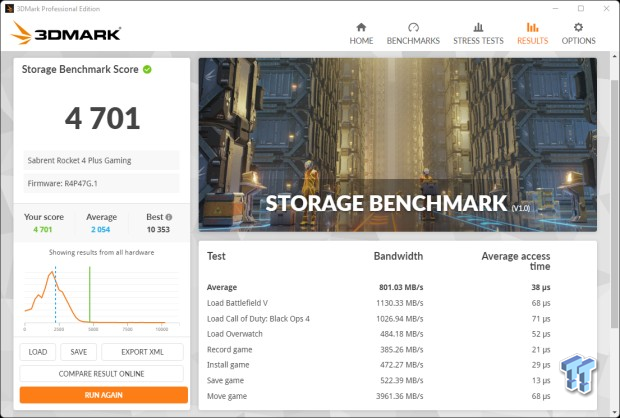
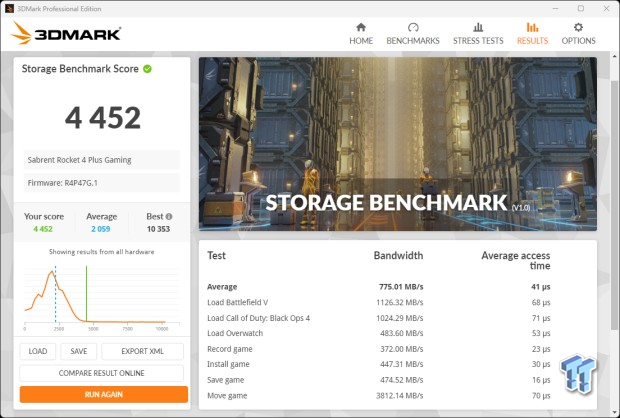
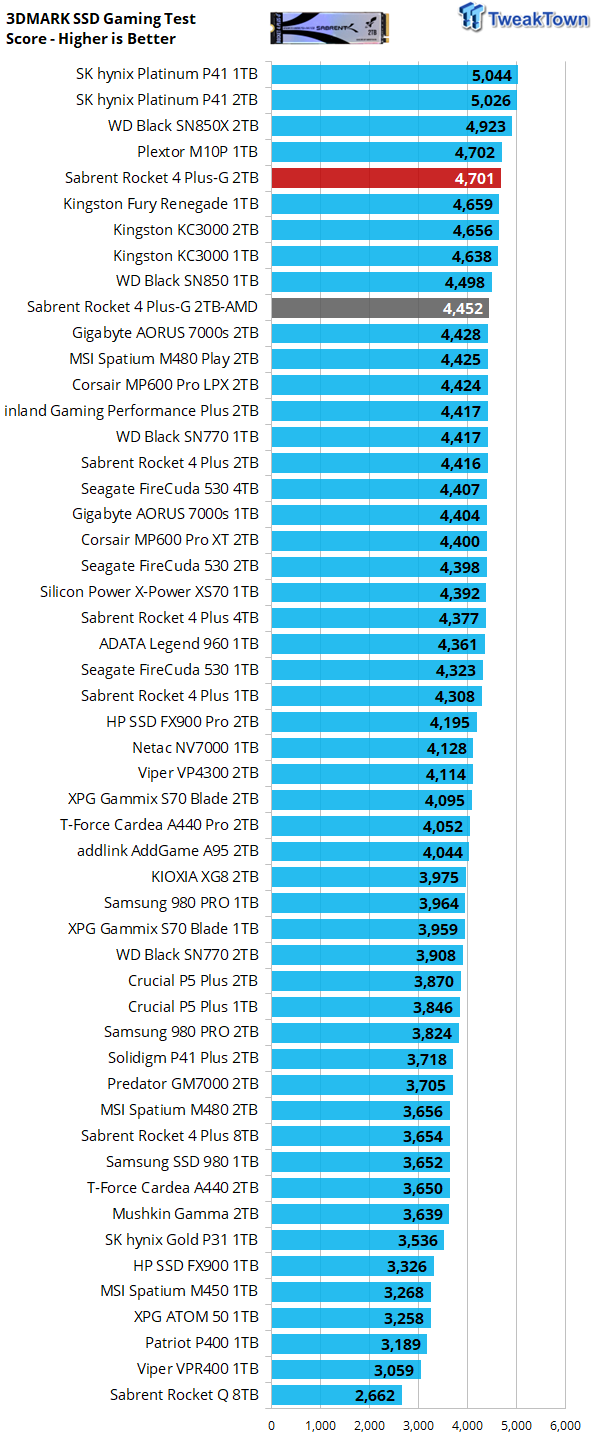
Gaming is a performance metric that matters to the majority of DIY consumers, especially to the enthusiast crowd that TweakTown caters to. Here is where Intel starts demonstrating that it still delivers superior real-world storage performance. This is what the Rocket 4 Plus-G is all about, gaming.
Sabrent's newest 2TB SSD outperforms its predecessors by a country mile, becoming the highest-scoring E18 controlled SSD we've ever tested against 3DMark and the 5th highest we've seen to date. Sabrent's state-of-the-art Oâ‚‚ GO firmware is again the difference maker. Outstanding. Performance that matters.
PCM10 Storage Tests
PCMark 10 Storage Test is the most advanced and most accurate real-world consumer storage test ever made. There are four different tests you can choose from; we run two of them.
The Full System Drive Benchmark and the Quick System Drive Benchmark. The Full System Drive Benchmark writes 204 GB of data over the duration of the test. The Quick System Drive Benchmark writes 23 GB of data over the duration of the test. These tests directly correlate with mainstream user experience.
PCMark 10 Full System Drive Benchmark
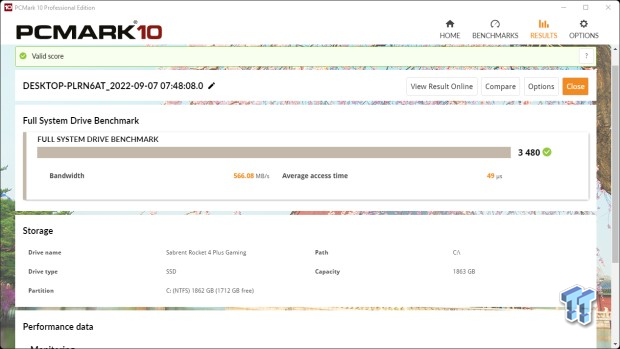
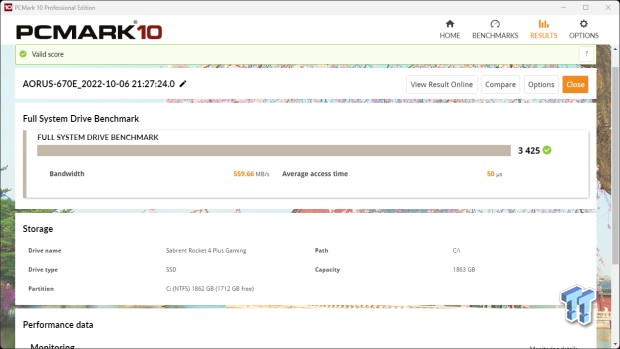
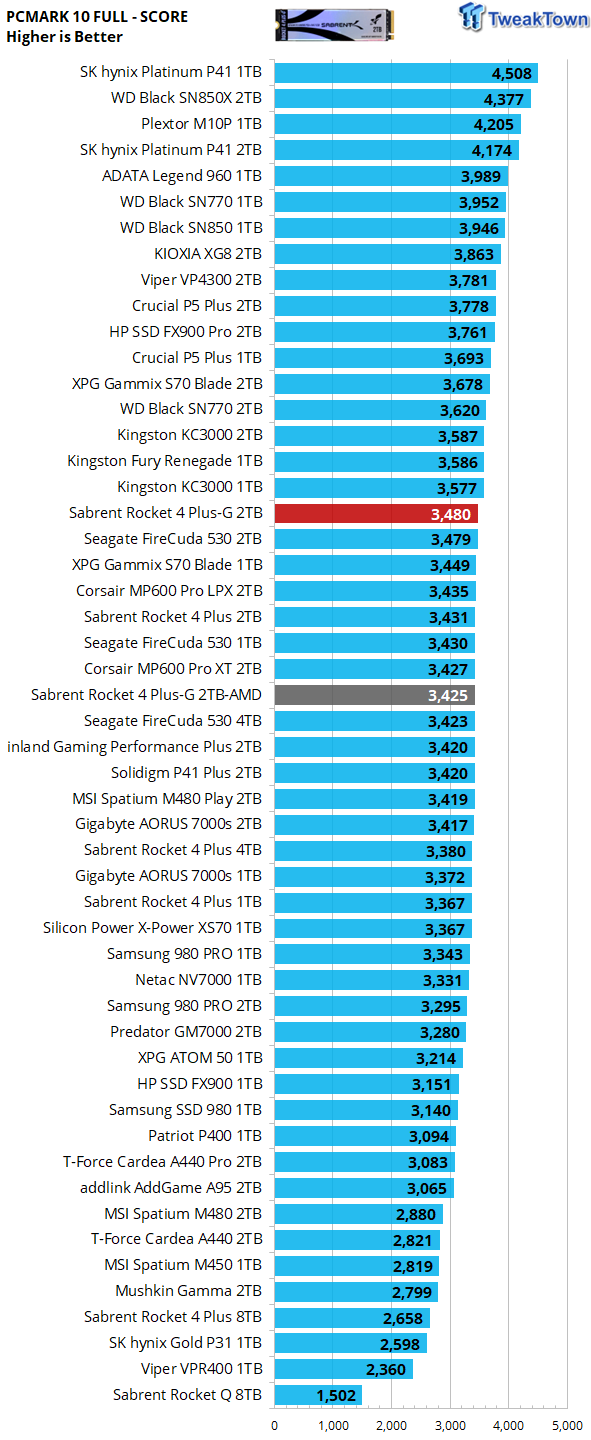
This particular test writes 204GB data and covers a broad range of common consumer tasks, including booting Windows 10, file transfers, Adobe and Office applications, and startup times for games, including Battlefield V, COD Black Ops 4, and Overwatch. Unlike synthetic numbers, this is comprehensive real-world data which is why we use it to rank SSDs in terms of user experience.
As clearly illustrated by our chart, Intel still delivers better real-world performance. As far as scoring goes, the 2TB Rocket 4 Plus-G delivers about as good as it gets for an E18-controlled SSD.
PCMark 10 Quick System Drive Benchmark
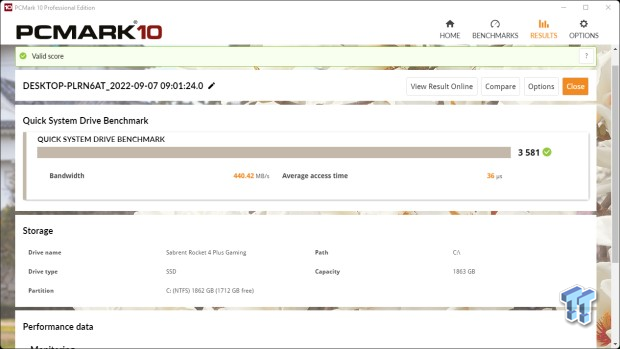
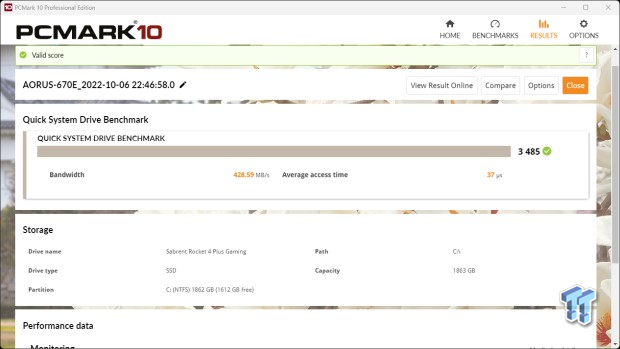
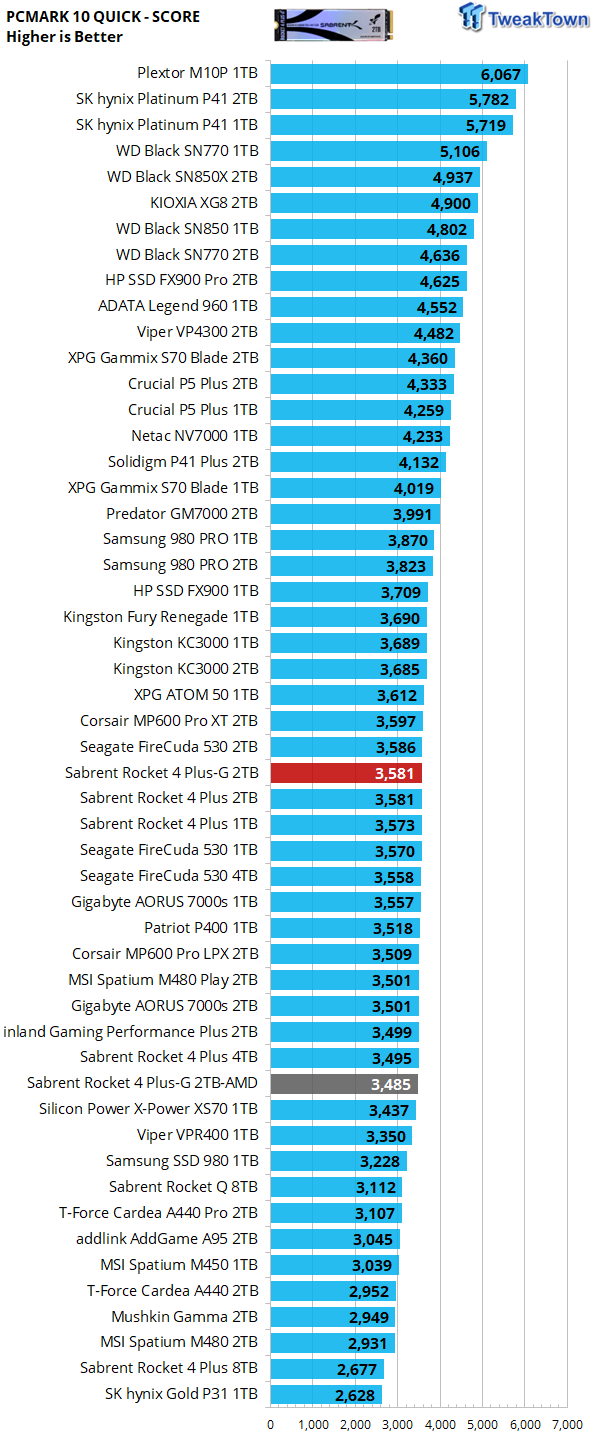
E18-controlled SSDs have traditionally choked hard on this test for whatever reason, and Sabrent's newest is no exception.
Final Thoughts
As we see it, Sabrent's Rocket 4 Plus-G SSD is made by forward thinkers for forward thinkers. We feel this SSD, while not overall the best performer as measured by conventional benchmarks, is not one to be overlooked. DirectStorage is impending; it's just a matter of time until it will be the standard for the best gaming experience.
Sabrent knows this, and as such, has invested heavily in delivering an SSD with by far the best sustained high queue depth read throughput, and lowest read disturb interference possible. Go take another look at our DirectStorage simulation result. It's beating Optane, and nothing else is even close. That's saying something.
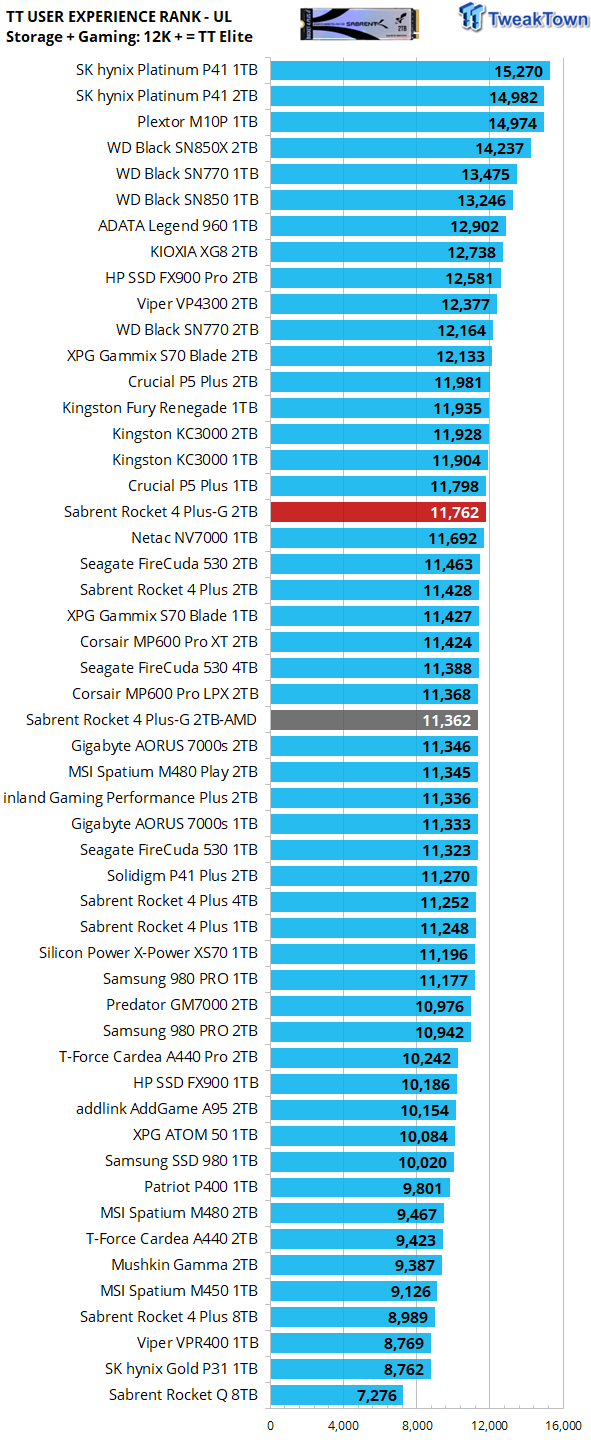
We rank SSDs in terms of overall user experience (performance where it matters most) as expressed by PCMark 10 storage and 3DMark gaming storage tests. We consider a user experience score of 12K or more to verify an SSD as a TweakTown Elite performer. The Rocket 4 Plus-G places very well on our chart, but not 12K well. This is as expected, as no E18-controlled SSD can hit 12K, not even the KC3000.
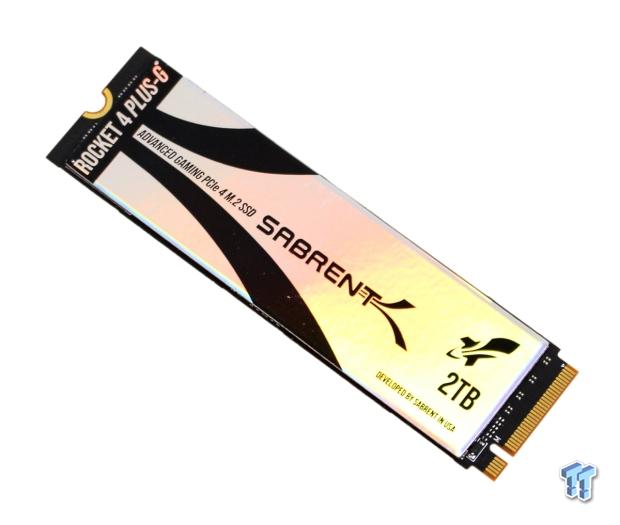
Third best gaming performance you can buy in the Americas, absolutely the best, cleanest, high-queue depth sustained read throughput we've ever seen, indicating that it is likely to be a DirectStorage juggernaut without equal, have earned Sabrent's 2TB Rocket 4 Plus-G a well-deserved Editor's Choice Award.

